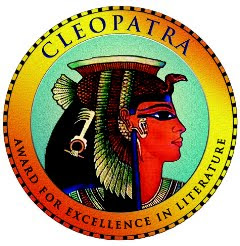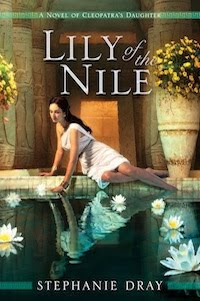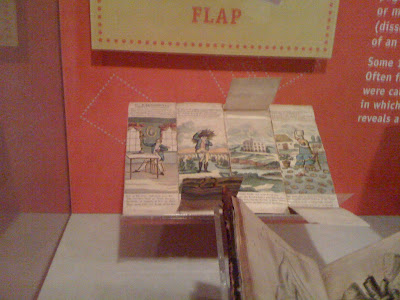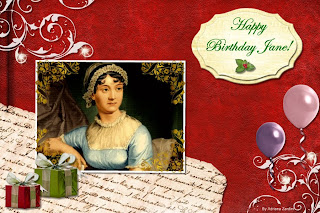 Stephanie Dray doesn’t set her books in Regency England. Instead, she goes back to the cultures of ancient Rome and ancient Egypt, both of which would have been familiar to the well-to-do of our period, when gentlemen (and some ladies) studied classical languages, and Napoleon’s invasion of the middle East opened up a whole aesthetic, with the adoption of classical and Egyptian motifs. Thomas Hope, anyone?
Stephanie Dray doesn’t set her books in Regency England. Instead, she goes back to the cultures of ancient Rome and ancient Egypt, both of which would have been familiar to the well-to-do of our period, when gentlemen (and some ladies) studied classical languages, and Napoleon’s invasion of the middle East opened up a whole aesthetic, with the adoption of classical and Egyptian motifs. Thomas Hope, anyone?
Stephanie is the author of a forthcoming trilogy of historical fiction novels set in the Augustan Age, starting with Lily of the Nile: A Novel of Cleopatra’s Daughter (January, 2011). Before she wrote novels, Stephanie was a lawyer, a game designer, and a teacher. Now she uses the transformative power of magic realism to illuminate the stories of women in history and inspire the young women of today. She remains fascinated by all things Roman or Egyptian and has–to the consternation of her devoted husband–collected a house full of cats and ancient artifacts.
 She’s also sponsoring the Cleopatra Contest for aspiring young female writers and you can find the details of her blog tour, with opportunities to win copies of the book and other prizes here.
She’s also sponsoring the Cleopatra Contest for aspiring young female writers and you can find the details of her blog tour, with opportunities to win copies of the book and other prizes here.
And now over to Stephanie…
 I’d like to thank the Riskies for welcoming me here today to talk about my debut novel, Lily of the Nile: A Novel of Cleopatra’s Daughter. The book follows the life story of this young princess of Egypt. Orphaned at the age of ten, taken prisoner by the Romans and marched through the streets in chains, she would learn to survive as a hostage and charm Rome’s first emperor into making her a queen.
I’d like to thank the Riskies for welcoming me here today to talk about my debut novel, Lily of the Nile: A Novel of Cleopatra’s Daughter. The book follows the life story of this young princess of Egypt. Orphaned at the age of ten, taken prisoner by the Romans and marched through the streets in chains, she would learn to survive as a hostage and charm Rome’s first emperor into making her a queen.
So what does this have to do with Regency Romances? Well, not much. However, there’s a surprising number of similarities between Regency England and Augustan Age Rome that make me think the latter should really make a comeback as a popular setting for fiction.
For one, there was the sexual repression. Though ancient Rome is known for wild orgies and sexual license, the Augustan Age was all about a return to “traditional family values.” Rome’s first emperor passed strict laws against adultery. Propriety in social situations was stressed. If young men wanted to advance politically, they would have to marry, and if women wanted any degree of independence, they were required to produce children. Of course, the penalties for scandalous behavior in the Augustan Age were decidedly harsher than in the Regency period. For example, when the emperor’s own daughter was caught up in a scandal, she was banished for the remainder of her life.
As far as historical periods go, it was also very clean. The stress on daily bathing was a constant in ancient Rome and flush toilet technology was not unknown. The upper class would have been washed and perfumed, a perfect recipe for romance. Heck, the Romans even had recipes for toothpaste.
Fashion was as important in ancient Rome as it was in the Regency era. While most of the statuary of the period shows dowdy matrons blanketed in voluminous gowns and shawls, this is because of the above-mentioned sexual repression. Augustus wanted his family to be seen as icons of morality, so his wife was usually portrayed without jewelry. But this was a matter of official form. We know for a certainty that the emperor’s wife owned wildly expensive jewels.
Official form notwithstanding, young women wanted to be seen in society wearing the most fashion forward patterns and colors. Dyes were so expensive that the purchase of a royal purple cloak could bankroll the founding of a small city. Women of the time period adorned their clothing with golden clasps, silvered girdles and pearl embroidery. They wore dangling earrings made of precious gemstones. They plucked their eyebrows–indeed, well-bred girls in search of a suitor plucked everything but the hair on their heads.
Just as Regency England had a strict social hierarchy of nobility and trade families, so too did Augustan Age Rome. Though the emperor himself was born into one of Rome’s oldest noble families, the Julii, he was from a branch that had mixed with the lower equestrian class. Because of this, he needed to bolster his noble status, so he married Livia Drusilla of the Claudii whose noble pedigree was unimpeachable. (Of course, even Livia’s noble bloodline wouldn’t have impressed my heroine, Cleopatra Selene, who was herself the daughter of the Ptolemies, the most royal family of the time period. It must have been difficult for her not to remind the emperor that she was a princess descended from the kin of Alexander the Great whereas he was the descendant of a freedman–a ropemaker–on his father’s side.)
Like the Regency Era, the Augustan Age was a time of cultural resurgence. Some of the most famous Roman poets flourished in this time. Virgil. Horace. And Ovid–though the latter ended up in disgrace for his scandalous erotic themes. What’s more, the Augustan Age was rife with family drama. Marriages, divorces, and disastrous love affairs all swirled around the succession. Can you see how this would make a juicy time period for writers to sink their teeth into?
Your comment or question enters you into a drawing for a free copy of Lily of the Nile, so let’s get chatting!
 Living in the DC suburbs almost guarantees that we rarely visit the museums and historic sites in the nation’s capital. You know how it is. The dh works downtown and that decreases his desire to spend weekends in the city. So naturally, when there are about a thousand things we needed to do, we instead decided we just HAD to visit the new American History museum. Here I am standing in front of a Revolutionary War uniform.
Living in the DC suburbs almost guarantees that we rarely visit the museums and historic sites in the nation’s capital. You know how it is. The dh works downtown and that decreases his desire to spend weekends in the city. So naturally, when there are about a thousand things we needed to do, we instead decided we just HAD to visit the new American History museum. Here I am standing in front of a Revolutionary War uniform.









